

The Lives Of The Super Wealthy. March 30, 2011 at 11:00 AM.
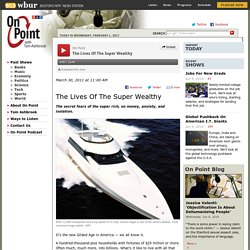
Making Networked Sharing Socially Beneficial, Not Just Predatory and Profitable. Every time Uber, the Web-based taxi intermediary, enters a new city, it provokes controversy about its race-to-the-bottom business practices and bullying of regulators and politicians.
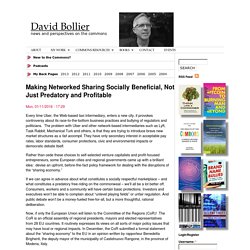
The problem with Uber and other network-based intermediaries such as Lyft, Task Rabbit, Mechanical Turk and others, is that they are trying to introduce brave new market structures as a fait accompli. They have only secondary interest in acceptable pay rates, labor standards, consumer protections, civic and environmental impacts or democratic debate itself. Rather than cede these choices to self-selected venture capitalists and profit-focused entrepreneurs, some European cities and regional governments came up with a brilliant idea: devise an upfront, before-the-fact policy framework for dealing with the disruptions of the “sharing economy.” Now, if only the European Union will listen to the Committee of the Regions (CoR)!
In terms of designing policy structures for the sharing economy, the CoR urges that: Chartbook of Economic Inequality – The long-run Perspective on Economic Inequality. The Egalitarian Program in Broad Strokes. Some of my Twitter critics say I put too much focus on welfare benefits, neglecting other components of an egalitarian agenda.
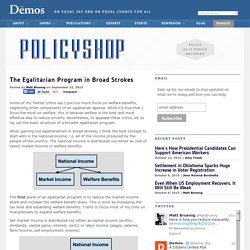
Income Inequality Grows With Age and Shapes Later Years. Photo A tale of two seniors.
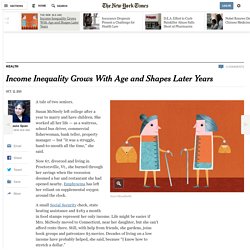
Susan McNeely left college after a year to marry and have children. Prof-Stephen-Hawking comments on Science AMA Series: Stephen Hawking AMA Answers! The 15-Word Fix for Tragically Misguided Logic (Needism) By Jag Bhalla This is diablog 7 between David Sloan Wilson (DSW, head of the Evolution Institute and author of Does Altruism Exist?)
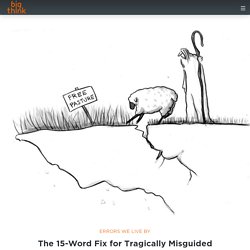
And me (JB). The sharing economy is bullsh!t. Here’s how we can take it back. The sharing economy is bullshit.
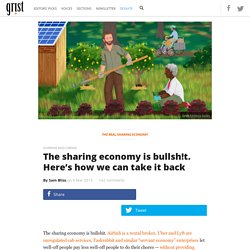
Airbnb is a rental broker. Uber and Lyft are unregulated cab services. Taskrabbit and similar “servant economy” enterprises let well-off people pay less well-off people to do their chores — without providing anyone the benefits and security of traditional employment. “Sharing” has been appropriated and stripped of all meaning by people trying to sell you things, much like sustainability was. Once “green” became hip and important about a decade ago, corporate bigwigs started preaching about sustainable profits and misleading eco-labels got slapped on single-use disposable plastic water bottles. A recent piece in The Nation indicted the so-called sharing economy on multiple counts: Class differences. University of California, Irvine, professor Paul Piff, PhD, starts his courses on class differences by asking students about their consumer habits: Do they shop at J.C.

Penney or Neiman Marcus? What kind of car do they drive, if they drive at all? What is their preferred breakfast, a fruit smoothie from Starbucks or a Dunkin' Donut? "As people reconstruct their days, it's clear that in every single decision they make, class is an essential feature," says Piff. The implications are larger than breakfast choice, he adds. Middle class Americans: Not so wealthy by global standards - Jun. 11, 2014. NEW YORK (CNNMoney) The numbers seem to back it up.

Americans' average wealth tops $301,000 per adult, enough to rank us fourth on the latest Credit Suisse Global Wealth report. But that figure doesn't tell you how the middle class American is doing. Americans' median wealth is a mere $44,900 per adult -- half have more, half have less. That's only good enough for 19th place, below Japan, Canada, Australia and much of Western Europe. "Americans tend to think of their middle class as being the richest in the world, but it turns out, in terms of wealth, they rank fairly low among major industrialized countries," said Edward Wolff, a New York University economics professor who studies net worth.
Welcome to Forbes. Poverty Is Not Inevitable: What We Can Do Now to Turn Things Around by Dean Paton. For the Love of Learning: John Oliver on the Wealth Gap and Inequality. It Matters How Rich the Rich Are. John Aziz at The Week argues that it does not matter how rich the rich are.
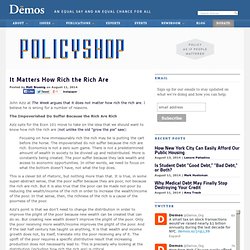
Sick of this market-driven world? You should be. To be at peace with a troubled world: this is not a reasonable aim.
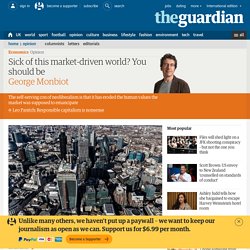
The evils of meritocracy. © Geert Vanden Wijngaert/AP/Press Association Images One of the few ambitions shared by politicians across the political spectrum is that of creating a fully meritocratic society, that is, a society in which all those who make it to the top do so only because of their own talents and abilities (rather than thanks to unfair privilege: upper-class parents, a friendship with the boss etc.).
Throughout the Western world, all governments have (in theory!) The common goal of trying to create a hierarchy based on actual ability, replacing posh, chinless halfwits with the meritorious, wherever they may be found and whatever age, colour or gender they might be. © PA/PA Wire/Press Association Images. The Great Philosophers 8: Theodor Adorno. © Getty Theodor Wiesengrund Adorno was born in Frankfurt in 1903 into a wealthy and cultured family. His father, a wine merchant, was of Jewish origin but had converted to Protestantism at university. Teddy (as his closest friends called him) was an extremely fine pianist from a young age.
Until his twenties, he planned for a career as a composer, but eventually focused on philosophy. THE FINANCIAL PHILOSOPHER: Foundations vs 'Castles in the Air' Why You Hate Work. Photo THE way we’re working isn’t working. Even if you’re lucky enough to have a job, you’re probably not very excited to get to the office in the morning, you don’t feel much appreciated while you’re there, you find it difficult to get your most important work accomplished, amid all the distractions, and you don’t believe that what you’re doing makes much of a difference anyway. By the time you get home, you’re pretty much running on empty, and yet still answering emails until you fall asleep. Increasingly, this experience is common not just to middle managers, but also to top executives. Our company, The Energy Project, works with organizations and their leaders to improve employee engagement and more sustainable performance. Continue reading the main story Regular time for creative or strategic thinking.
Inequality Is Not Inevitable. AN insidious trend has developed over this past third of a century. A country that experienced shared growth after World War II began to tear apart, so much so that when the Great Recession hit in late 2007, one could no longer ignore the fissures that had come to define the American economic landscape. How did this “shining city on a hill” become the advanced country with the greatest level of inequality?
Why No Sustained Protests (Yet)? How economic news keeps us dumb and stops us changing the world. In their more serious moods, news organisations tell us they want to explain the world to us. And that often means talking about money. Our Cubicles, Ourselves: How the Modern Office Shapes American Life - Rebecca J. Rosen. Jordan Richmond/Flickr. Capitalism simply isn't working and here are the reasons why. ‘Slomo’ Last Word On Mozilla. The Cheapest Generation - Derek Thompson and Jordan Weissmann. In 2009, Ford brought its new supermini, the Fiesta, over from Europe in a brave attempt to attract the attention of young Americans. Finnish Education Chief: 'We Created a School System Based on Equality' - Christine Gross-Loh.
Three Rules to Make Sure Economic Data Aren’t Bunk. Mainstream economics coverage is full of numbers: unemployment, inflation, the trade deficit, etc. Four Myths About Poverty - The Chronicle Review. By David B. Heather McGhee on the Need for New Economic Paradigms. Poverty in America Is Mainstream. Virginia Eubanks: Deconstructing the Digital Divide.
The deal with rich people. The top 10 myths about working retail – at the holidays and beyond. The Economic Value of Caring. The High Cost, for the Poor, of Using a Bank. Data on Poverty & Income. Michel Bauwens: Four Scenarios for the Collaborative Economy. Opinion: The most unequal place in America. Pathways 2013 Conference. “Debt of the Elderly and Near Elderly, 1992–2010,” and “Employer and Worker Contributions to Health Reimbursement Arrangements and Health Savings Accounts, 2006–2012” The Plastic Safety Net: 2012. Michael Sandel: Why we shouldn't trust markets with our civic life. Lawrence Lessig: We the People, and the Republic we must reclaim. Chrystia Freeland: The rise of the new global super-rich.
The death of the middle class will undermine our democracy. The Austerity Delusion. Economists disagree on whether the minimum wage kills jobs. Why? Encore: The Faces of America’s Hungry. Unemployed and Older, and Facing a Jobless Future. Millennium Wave Advisors. The Charitable-Industrial Complex. McDonald's Can't Figure Out How Its Workers Survive on Minimum Wage - Jordan Weissmann. About the Living Wage Calculator. Richard Wilkinson: How economic inequality harms societies. On Winner-Take-All Politics. Capitalism’s ‘Sacrifice Zones’ The growth of monopoly power » Search Results.
United States of ALEC. Viral Video Shows the Extent of U.S. Wealth Inequality. Plutocracy Rising. Close To Home. The Warning.